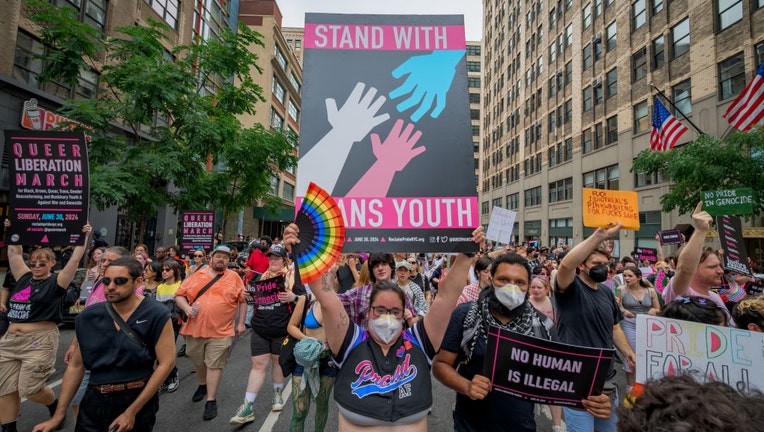Transgender care for minors case lands at the Supreme Court: What to know

FILE-Participants hold signs during a transgender rights demonstration. (Photo by Erik McGregor/LightRocket via Getty Images)
The Supreme Court will hear arguments on Wednesday in its second major transgender rights case, which is a challenge to a Tennessee law that prohibits gender-affirming care for minors.
A decision by the justices is not expected for several months, but the Associated Press reported that this could impact similar laws passed by another 25 states and other efforts to control the lives of transgender individuals, including which sports they can compete in and which bathrooms they have access to.
RELATED: Judge blocks Arkansas ban on gender-affirming care for transgender minors
The Biden administration and transgender families in Tennessee are also challenging the state’s law.
According to the AP, the issue in the Tennessee case revolves around whether the law violates the equal protection clause of the 14th Amendment, which requires the government to treat similarly situated people the same.
Tennessee's law bans puberty blockers and hormone treatments for transgender minors, but not "across the board," lawyers for the families wrote in their Supreme Court brief, the AP reported.
RELATED: Iowa governor signs gender-affirming care ban, bathroom law
The lead lawyer, Chase Strangio of the American Civil Liberties Union, is the first openly transgender person to argue in front of the justices.
Tennessee concedes that the same treatments that are banned for transgender minors can be prescribed for other reasons. But it refutes the claim that it is discriminating based on sex. Instead, it says legislators acted to protect minors from the dangers of "life-altering gender-transition procedures."
RELATED: Gender-affirming care for kids being dropped by some providers in cases where it's legal
Tennessee Attorney General Jonathan Skrmetti wrote in the state's Supreme Court brief that the state’s law "draws a line between minors seeking drugs for gender transition and minors seeking drugs for other medical purposes. And boys and girls fall on both sides of that line," the AP noted.

